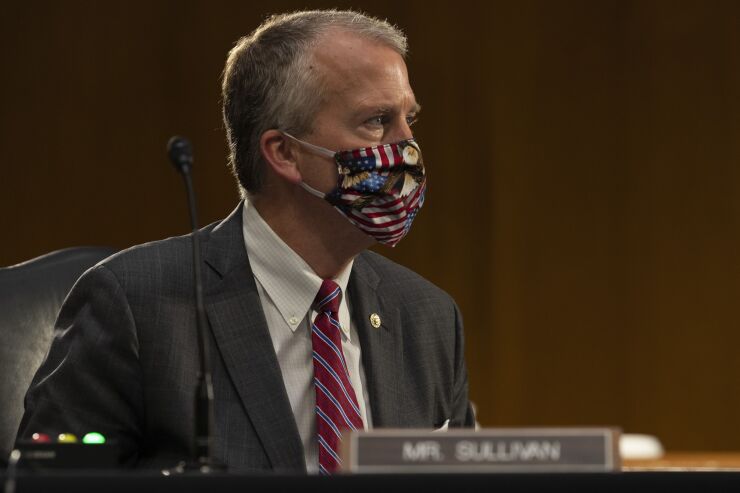Ports call a recently introduced bipartisan Senate bill that awards grants to go toward emergency response and debt service payments necessary to mitigate the effects of the pandemic and future disasters.
Sens. Jeff Merkley, D-Ore., and Dan Sullivan, R-Alaska, introduced a bill called the Maritime Transportation System Emergency Relief Act late last week that would allow the U.S. Department of Transportation’s Maritime Administration to provide emergency grants to U.S. ports for the first time. Those grants would pay for ports’ emergency response operations, cleaning, paid leave, workforce retention, debt service payments, infrastructure repair projects, among others.
MARAD does not currently have the authority to provide emergency relief grants.
“This proposal would establish a permanent vehicle to provide relief to U.S. ports and the maritime industry following a natural disaster, whether that be a hurricane, flood, earthquake, tsunami, or future pandemic,” wrote American Association of Port Authorities CEO Christopher Connor. “It’s become crystal clear that such a program is necessary to help our nation’s ports to manage the effects of this pandemic and future disasters as they impact ports’ ability to function efficiently and maintain a state of readiness.”
The House introduced an identical companion bill on July 9, which was then included in the National Defense Authorization Act. That bill, introduced by Reps. Peter DeFazio, D-Ore., and Sean Patrick Maloney, D-N.Y., passed through the House on July 21.
Recognition from both the House and Senate in a bipartisan manner shows that there is a need for a relief program in the maritime industry for ports, said Evan Chapman, AAPA director of government relations.
The pandemic has been especially hard for businesses in Sullivan’s state of Alaska that rely on the maritime transportation system for a large part of their annual revenue, he said.

“With all major cruise ships voyages stopped, our ports, shipyards, and hard-working Alaska longshoremen are all facing tremendous losses,” Sullivan said in a press release. “This new grant program would provide much needed financial relief to sustain these vital industries, which are critical economic components in coastal communities all across Alaska.”
However, the bill could take months to become law.
Chapman said the Senate’s Maritime Transportation System Emergency Relief Act was likely to be included in the NDAA, but that isn’t likely to pass or go into conference until December, he said.
“However, ports are in need now for aid,” Chapman said. “We’re hopeful that this bill, as well as relief dollars will be included in whatever coronavirus relief package that is being negotiated.”
This comes as AAPA has asked Congress for $1.5 billion in direct grants to public ports to ensure that ports are able to make bond and other debt payments. Chapman has said there is no indication that ports would not be able to make their debt payments, but said the future is uncertain.
Congress could pass a collective COVID-19 relief bill this week and according to multiple news reports, the House decided to cancel its August recess and will remain in session until a bill is passed.
Ports have weathered fairly well under the pandemic, though that’s not to say they haven’t been impacted. As of July, container cargo declined by roughly 20% and cruise ship business is down as much as 80% according to AAPA.
Projects are beginning to get delayed or canceled due to COVID-19. A new cruise facility at the Port of Seattle was put on pause in April due to the pandemic, according to Seatrade Cruise News. The port’s spokesman said it was evaluating the impacts of COVID-19 on its capital budget process.
Aaron Ellis, AAPA public affairs director, said many ports had significant infrastructure investments planned before the pandemic, many of which would have been bond financed.
“Consequently a lot of those ports are having to review and rethink those investments as a result of the pandemic, which is costing an extraordinary amount of money,” Ellis said.
Last week, the Canaveral Port Authority, which relies heavily on the cruise industry, decided to reduce its employees by more than 40% through layoffs, furloughs and attrition, according to the Maritime Executive.
As for immediate relief for ports in the next week, “We just have our fingers crossed that as negotiations take place, that ports are included,” Chapman said.





